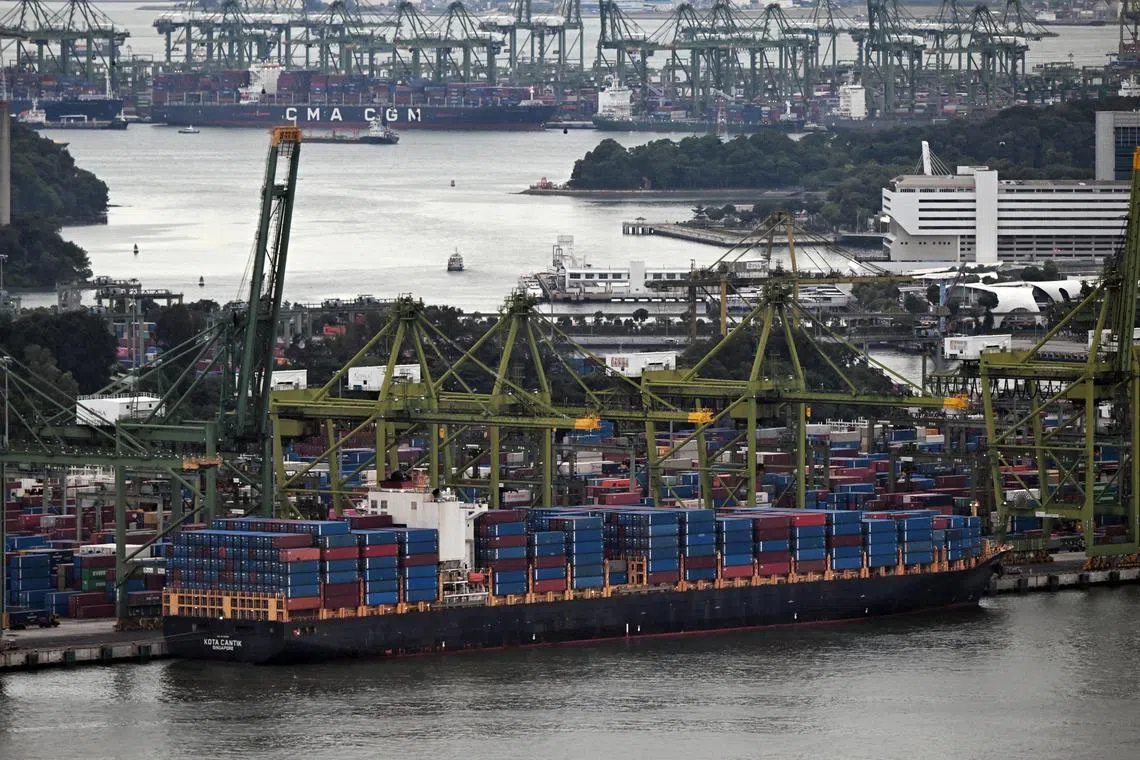Singapore must prepare for new global order, seek new opportunities in tariff chaos: DPM Gan
Sign up now: Get ST's newsletters delivered to your inbox

Deputy Prime Minister Gan Kim Yong delivering his opening remarks at a gathering of businessmen organised by DBS Bank on April 17.
PHOTO: DBS BANK
SINGAPORE - Singapore needs to prepare for a new economic and geopolitical environment that is more protectionist, arbitrary and dangerous, besides managing the hit to economic growth this year, said Deputy Prime Minister Gan Kim Yong.
Speaking at an event organised by DBS Bank on April 17, DPM Gan said Singapore and its trading partners worldwide will have to contend with the trade and investment paralysis caused by US President Donald Trump’s new tariff regime.
But, at the same time, Singapore will work with like-minded countries to expand its trade partnerships, forge new alliances, and reform and strengthen the multilateral trading system.
“These moves will open up new opportunities for businesses to explore new markets and strengthen their supply chains,” he said.
Singapore, which currently imposes zero tariffs on US imports, is still subject to a baseline 10 per cent rate.
While much higher tariffs announced for other countries have been put on hold for a 90-day period ending in July,
DPM Gan said the baseline tariff does not appear to be open for negotiation, and will likely be the fixed minimum rate going forward, regardless of a country’s trade balance or existing trade arrangements with the US.
In addition to the baseline tariff, the US has signalled that further tariffs are likely in the coming weeks or months, particularly on semiconductors and pharmaceuticals – two sectors that account for a large chunk of Singapore’s exports and have in recent years seen large investments from multinationals.
Hence, the economy is expected to slow down significantly, and possibly slip into a recession, in 2025 with negative consequences for jobs and wages.
To support businesses and workers tackling both the immediate and long-term impact of the new US tariff regime, which has sparked volatility in markets worldwide and cast a pall on the global economy, Prime Minister Lawrence Wong announced the setting up of a task force on April 8.
DPM Gan, who is also Minister for Trade and Industry, chairs the Singapore Economic Resilience Taskforce,
The task force will also assess the specific issues faced by businesses, review whether current support is adequate, work with unions to mitigate the impact on workers and help job seekers, and develop additional measures when required, said DPM Gan.
It will work with businesses and workers to reposition themselves in the new economic landscape, he added.
DBS said it organised the April 17 event as the first in a series of engagements between the task force and the business community.
Addressing the gathering, the bank’s new chief executive Tan Su Shan said that amid the heightened uncertainty, it was more critical than ever to convene such conversations.
“In the short term, I would say, be prepared for volatility and uncertainty,” said Ms Tan.
But in the long run, businesses will have to be more strategic, find new supply chains and new demand markets, she added.
DPM Gan said the intensifying US-China trade war will have significant ramifications for the global economy, given how other countries around the world, including Singapore, are embedded in the production and supply chains of both the US and China.
As the largest investor in Singapore and South-east Asia, the US’ shift towards reshoring or onshoring will impact future investments by US companies here and in the region.

Singapore, which currently imposes zero tariffs on US imports, is still subject to a baseline 10 per cent rate.
ST PHOTO: KUA CHEE SIONG
DPM Gan said the US has stated plainly that the tariffs are meant to shore up domestic production in key industries, which it views as critical to its national and economic security.
A slowdown in trade with the US, as well as a pullback in investments from US companies, will surely impact the growth of this region.
“As it enacts tariffs and aims to reshore investments back to the US, our ability to attract investments, and therefore create good jobs, will be affected,” he said.
The US’ “reciprocal tariffs” have also upended the cornerstone of the rules-based trading order, which is especially important for Singapore.
“If other countries adopt the same approach to trade only on their own preferred terms, larger economies will possess stronger levers. On the other hand, we and our businesses risk being marginalised, left behind,” DPM Gan said.
“Last but not least, the brinkmanship between the US and China will impact not just the global economy, but also regional peace and stability.”



